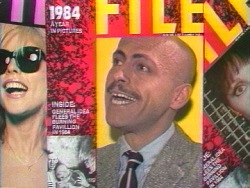General Idea
The artist collective General Idea — AA Bronson, Felix Partz and Jorge Zontal — forged a unique conceptual practice that deployed parody and irony to critique the artworld and popular media culture. In performances, installations, video, photography, prints, and editions, they explored social phenomena ranging from the production, distribution and consumption of mass media images to gay identity and the AIDS crisis. General Idea worked together from 1969 until the deaths of Partz and Zontal in 1994.
General Idea was formed in Toronto by George Saia, Ronald Gabe and Michael Tims, who assumed the identities Jorge Zontal, Felix Partz and AA Bronson, respectively. The collective name General Idea was adopted in 1969. Their early fictional construction "Miss General Idea," which became the group's official muse, was featured in the Miss General Idea Beauty Pageants, a series of legendary performance art events that began in 1970. Such forays into cultural satire would continue to take new forms, as the group harnessed the inherently viral nature of popular images in mass culture. Exploring branding and logos to interrogate the production and consumption of art as commodity, the group made use of media in its every incarnation.
General Idea's twenty-five years of collective output generated a body of work that, in addition to performance, multiples, photographs, video and installations, took the form of an eclectic range of distributed media, including postcards, posters, pins, stamps, press releases, wallpaper, drinking glasses, inflatables, advertisements and publications.
In their critique of art world structures, including the museum and the gallery, one of General Idea's key operating tactics was to intervene in and control the production and distribution of their own artworks. Central to this strategy were the 1984 Miss General Idea Pavilion, an extended project, and the General Idea boutiques, installation pieces that functioned as shops for selling their multiples and editions. In 1974 General Idea founded Art Metropole, an organization devoted to collecting, publishing and distributing artists' books, multiples, audio and video, which continues today.
From 1972 to 1989 they published the influential FILE magazine (subverting the logo and format of Life magazine), which, with its ironic tone and irreverent content, served as an "alternative to the Alternative Press." Never didactic, General Idea operated in the realm of humor and an often outrageous pop sensibility.
As an extension of their distributed media projects, General Idea's video works ranged from performance documents to narratives and mock TV shows. In the 1979 video Test-Tube, General Idea stated: "We don't want to destroy television as we know it. We want to add to it, stretch it until it starts to lose shape, stretch the social fabric...Imagine all those new sensibilities taking up more and more room, those chaotic situations on the fringe of society flooding the mainstream..."
In the 1980s and early 1990s, General Idea began to focus on the AIDS epidemic and its cultural and political implications, as seen in installations such as Red (Cadmium) PLA©EBO (1991) and One Day of AZT (1991). General Idea's 1987 reconfiguration of Robert Indiana's famous LOVE logo as "AIDS," which was widely disseminated as posters, wallpaper and other forms, became one of the iconic gestures of 1980s' AIDS activism.
AA Bronson (Michael Tims) was born in Vancouver, British Columbia, Canada in 1946. He works independently as an artist. Felix Partz (Ronald Gabe) was born in Winnipeg, Manitoba, Canada in 1945, and died in 1994. Jorge Zontal (Slobodan Saia-Levy) was born in Parma, Italy in 1944, and died in 1994.
General Idea's video works have been exhibited and broadcast internationally for the last 40 years, including Projects Video VIII at the Museum of Modern Art, New York (1976); the Paris Biennale (1977); Stedelijk Museum, Amsterdam (1979); Canadian Pavilion, Venice Biennale (1980); Documenta 7, Kassel (1982); General Idea Retrospective at International Festival du Nouveau Cinema, Montreal (1985); Video as Television, Museum of Modern Art, New York (1989); Videotapes by General Idea, National Gallery of Canada, Ottawa (1993); General Idea, World Wide Video Center, The Hague (1994); Video Acts, PS1 Contemporary Art Center, Long Island City (2002); Changing Channels, MUMOK, Vienna (2010). General Idea's videos have been broadcast internationally since 1977, and have been awarded the Portopia Award (1981), The Bell Canada Award in Video Art (2001), The Governor General's Visual Art and Media Award (2002), and the Skowhegan Medal in Multi Media (2006).








